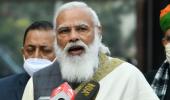Our precipitous decline is being noticed and recorded abroad with alarm.
It is strange that within India we are carrying on as if it is business as usual, observes Aakar Patel.

In 2020, the Modi government decided to improve India's standing on various indices that showed a deterioration in governance.
These indices that were upsetting Delhi spanned from those produced by non-profits working in specialised areas, multilateral bodies like the United Nations, institutions traditionally seen as being on the Right, like the World Economic Forum and The Economist, and also the government's own data.
The government was clearly concerned about its drop.
We know this because it put out a press release on 10 July with the headline: 'NITI Aayog organises a virtual workshop to monitor performance of 29 select Global Indices'.
At this workshop it was decided that the government would prepare a 'single, informative dashboard for all the 29 Global Indices' which would allow for 'monitoring of the parameters as per official data as well as the data source used by the publishing agencies'.
This monitoring exercise was 'not just to improve rankings but to improve systems and drive reforms to attract investments and to shape India's perception globally.'
The government appeared to believe that the issue was one related to image rather than reality.
A report the next month said the government was 'working to improve India's ranking on 29 global indices, and it wants the message to reach everyone loud and clear.'
The way it would do this was 'a massive publicity campaign' that would 'shape India's perception' through advertising and 'micro-sites of ministries' and it would also 'publicise the problems, parameters and data sources of global indices.'
Would this address the problem at hand? It would not.
The issue was not one of perception or bias, but one of fact.
The world was not conspiring to show us in a bad light.
The solution lay in acknowledging that India had been declining in several areas since 2014 and working on trying to improve them.
Spending money on a media campaign would not change the numbers.
India's discrediting the data of all these agencies and institutions was unlikely to reverse the views of those who had looked at and understood the facts.
Under Modi, India's ranking rose on three indicators (including the World Bank's Doing Business index), it remained the same on two but and fell on forty-one.
The decline was so broad and so pronounced that organisations captured similar results through different methodologies.
India since 2014 has done poorly on six indices that tracked civil liberties and pluralism, five that tracked health and literacy, two tracking religious freedom and minorities, two tracking internet denial, six tracking national power of various types, four tracking rule of law and corruption, four tracking sustainability and the environment, four tracking gender issues and their safety, four tracking economic freedoms of Indians and four tracking urban spaces.
The record leaves little room for debate or dispute.
The scale and rapidity of decline in governance is manifest.
It may appear strange the Modi government should have thought that reversing this performance required 'a massive publicity campaign' which would 'shape India's perception' through advertising and more Web sites, but it is how the government thought.
A more credible response might have been to say that the decline was not the Modi government's doing entirely; to deny it in total was to run away from the problem.
The solution was not 'image correction' but improving performance through governance.
After the publicity strategy had fallen through for whatever reason the government then decided around the end of 2020 that if it asked ministries to 'ensure swift and updated data' it would help on the indices.
This was based on the assumption that the government's work was excellent; it was merely data lag that had caused it to plummet.
This was also, of course, wrong, and the indices that have come out after that showed continued decline.
The latest report has come this week from Freedom House which says India is not free but 'partly free'.
This is not opinion; it is based on a set of indicators.
India says it is democratic. Freedom House agrees.
It gives India 34/40 on political rights. Full marks for free and fair elections, election commission impartiality, freedom to start political parties, opportunities for Opposition to increase their power.
Not full marks on whether voting is hampered by violence and affected communal tension.
All this we already know. The fact is that we do very well on political rights, and in fact the government gets 3/4 on transparency which is hardly accurate.
The problem is that political rights are only 40% of the Freedom House score.
The other 60% is civil liberties. Here we perform poorly (33/60).
On the issues of freedom of expression, religion, academic freedom, freedom of assembly, freedom for NGOs to work (the report names the attack on my former organisation Amnesty India specifically), rule of law, independence of judiciary, due process by police and so on our rating is poor.
Can we disagree with this? We cannot. The answer is not to deny as the government has done through a one page response.
This will not work because another report is coming next week, the reputable Varieties of Democracy report from the University of Gothenburg.
Last year's report said 'India has continued on a path of steep decline, to the extent it has almost lost its status as a democracy.'
Our precipitous decline is being noticed and recorded abroad with alarm.
It is strange that within India we are carrying on as if it is business as usual.
Aakar Patel is a columnist and writer and you can read Aakar's earlier columns here.
Feature Presentation: Aslam Hunani/Rediff.com











 © 2025
© 2025